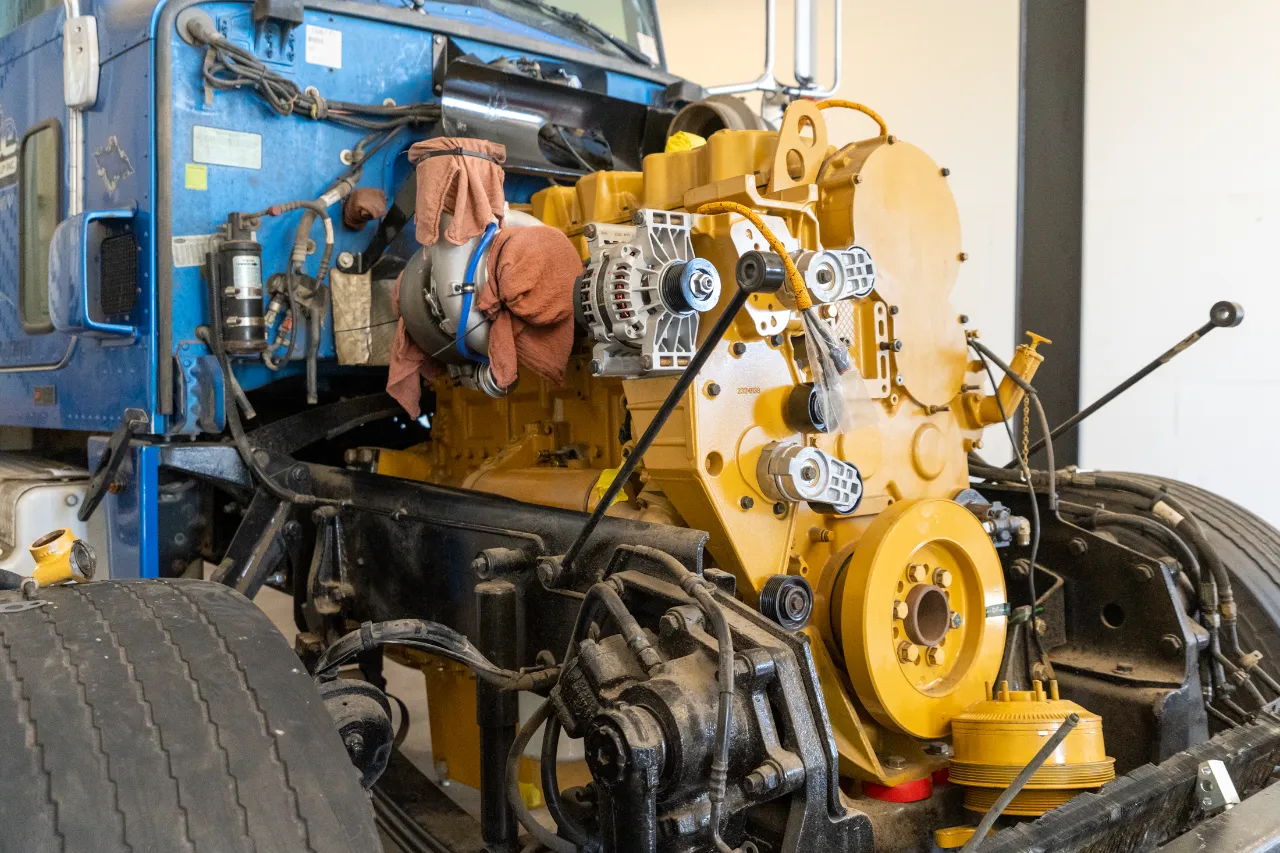How to Prepare Your Engine This Winter

Winter in Chicago isn’t for the faint of heart, and neither is prepping your diesel engine for the bone-chilling cold. Neglect winter prep, and you could be dealing with engine failure, frozen fuel lines, or a roadside breakdown on I-90—not exactly the kind of holiday cheer you want. Here, we’ll discuss the most critical steps to winterize your engine, avoid costly downtime, and keep your truck or bus running like a champ all season long.
How to Prepare Your Engine For Winter
To prepare your engine for winter, start by using the correct coolant mixture and inspecting the system for worn components. Switch to winter-grade engine oil and add anti-gel treatments to your fuel to prevent freezing. Test your glow plugs, block heaters, and batteries' cold cranking rates (CCR) for reliable starts, and ensure all belts and hoses are flexible and free from cracks or wear.
1. Check Your Coolant System
Your coolant system is your engine's first line of defense against freezing temperatures.
Coolant (also called antifreeze) should have the proper freeze protection and water-to-antifreeze ratio: usually 50/50, though it can vary by brand. If the mixture isn’t right, it won’t absorb or disperse heat efficiently, putting your engine at risk of overheating or freezing up.
Also, inspect your radiator, water pump, and hoses for cracks, clogs, or wear. A leak now could turn into a full-blown failure once temperatures dip.
Pro Tip: Use a refractometer or coolant test strips to verify freeze protection.
2. Protect Your Fuel System from Gelled Diesel
When diesel fuel gets cold, it starts to gel and turns into a waxy sludge that clogs filters and halts combustion.
To avoid this, always use winter-grade diesel fuel blended with anti-gel additives, especially in a climate like Chicago. Also, don’t forget to inspect and replace your fuel filters, as old or clogged filters can restrict flow and make it even easier for fuel to gel.
In extreme conditions, consider using an in-line fuel heater to keep things flowing smoothly.
3. Glow Plugs and Block Heaters: Cold Start Saviors
If your glow plugs aren’t working properly, your diesel engine will struggle—or flat-out fail—to start in cold weather. These small but mighty components heat the air inside your cylinders to aid combustion during startup.
Also, check your block heater. This electric heater warms your engine’s coolant or oil before you turn the key. In sub-zero temps, it could be the difference between a smooth start and sitting idle in the depot.
Before the first cold snap, test the block heater plug and cord. If it's frayed or corroded, replace it. A malfunctioning block heater isn't just useless; it's dangerous.
4. Don’t Overlook the Battery
Cold weather drastically reduces battery efficiency. Diesel engines, with their high compression ratios, require more cranking power than gasoline engines. That’s a problem when your battery is already losing charge in the cold.
Before winter hits, test your battery’s cold cranking amps (CCA), inspect for corrosion at the terminals, and ensure your alternator is functioning properly to recharge it after startup.
If your battery is near the end of its service life, replace it before it fails on a frigid morning.
5. Swap Your Engine Oil if Needed
As temperatures fall, oil viscosity thickens. If your engine oil isn’t rated for cold-weather performance, it may not circulate properly, putting your crankshaft bearings and other vital components at risk.
Switch to a winter-grade oil with a lower cold-temperature viscosity—like 5W-40 full synthetic diesel oil—to maintain proper lubrication and avoid dry starts.
Pro Tip: Check your OEM manual or ask your tech what viscosity your engine needs based on winter temps.
6. Inspect Belts, Hoses, and Pulleys
Rubber gets brittle in the cold. A cracked serpentine belt or leaking hose could spell disaster when you're 50 miles outside the city in a whiteout.
Make sure all belts and hoses are pliable and free of wear. Check tensioners and pulleys too—friction components are already under stress in winter.
Bonus: Monitor Air Systems (Yes, They Freeze Too)
If your truck relies on air brakes or air suspension, remember to drain your air tanks daily and check your air dryer for proper function.
Moisture in air lines can freeze, causing brake failure or a no-start scenario in cold climates. If your air dryer cartridge hasn’t been replaced in a while, now’s the time.
Bonus: Keep an Emergency Kit Onboard
Even the best-prepped engine can still run into trouble. Stock your truck with:
- Extra fuel additives
- Jumper cables
- Winter oil and coolant
- Hand warmers
- Cold-rated work gloves
- Emergency food and water
And don't forget that tow rope or chains—just in case.
Wrap-Up: Stay Ahead of Winter Trouble
A Chicago winter can put your engine through the wringer. But by staying ahead of the cold and prepping your diesel’s core systems—from coolant and fuel to batteries and glow plugs—you’re drastically reducing your risk of costly downtime or unsafe conditions.
And let’s be real: a warm cab and a running engine beat standing on the shoulder of I-55 in a snowstorm every time.
Don’t wait until you’re iced in. Call your trusted heavy-duty engine mechanic and get your winter prep started now.
Similar posts
.webp)
What’s the Best Way to Maintain Your Truck’s Electrical System?
Your truck’s electrical system keeps everything running, from cold starts to critical engine controls. This guide explains key components, common warning signs, and preventive maintenance tips to help Chicago drivers avoid breakdowns and costly downtime.
.webp)
Is Fleet Management Software Worth It?
Is fleet management software worth it? This guide breaks down how digital platforms improve preventive maintenance, fuel efficiency, compliance, safety, and real-time tracking—while highlighting costs and choosing the right system. Learn why Chicago fleets benefit most.
